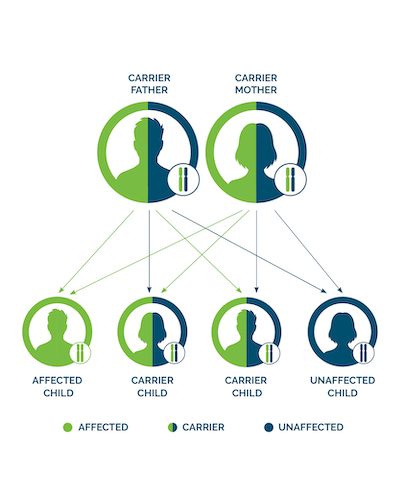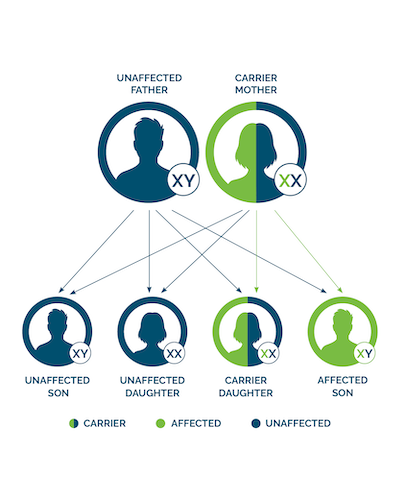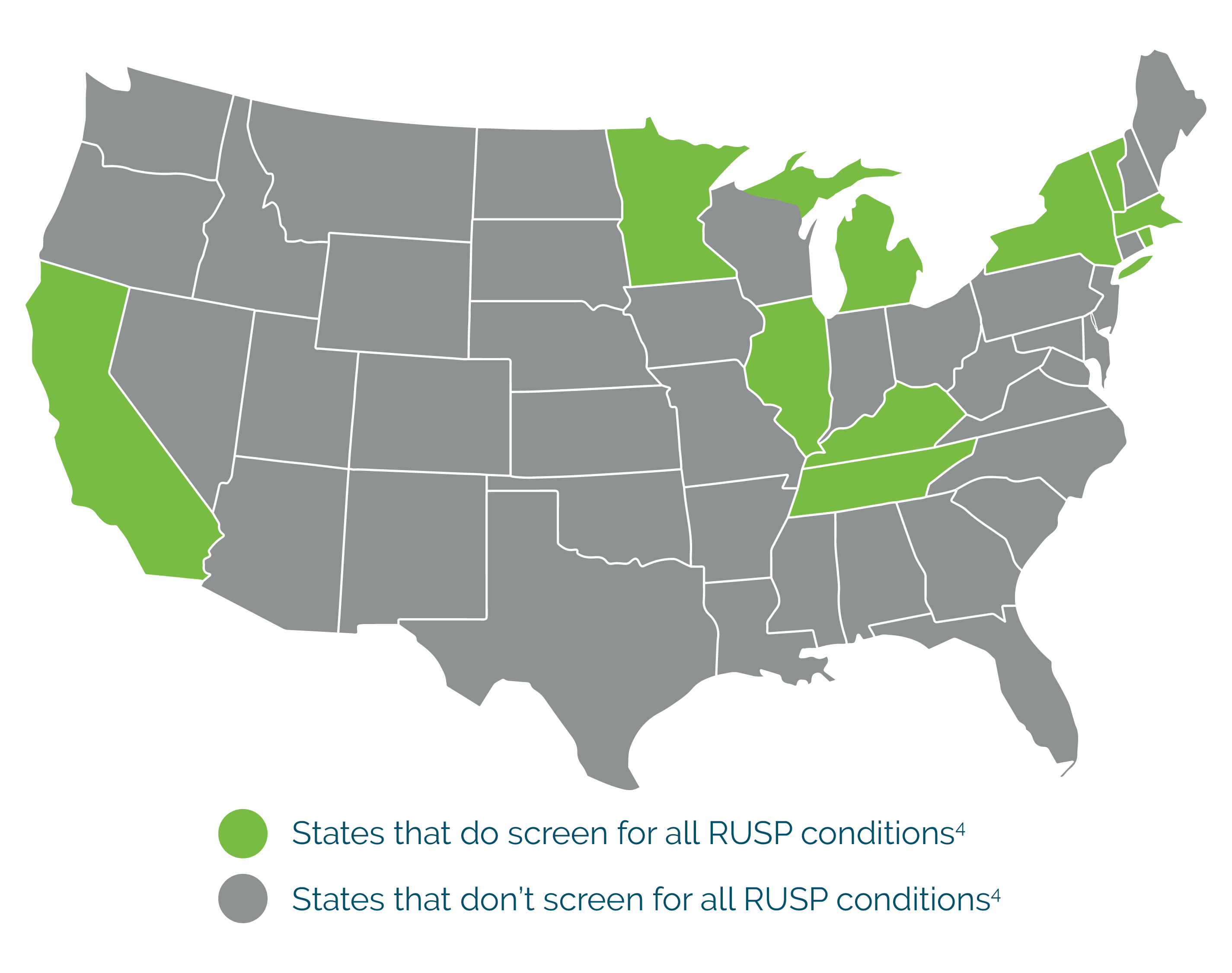
Carrier Screening
Begin your reproductive journey with NxGen MDx carrier screening to determine your risk of passing on inherited genetic conditions to your child. Carriers of genetic conditions are generally healthy and typically don’t show symptoms. However, if both reproductive partners are carriers of the same condition, there is a risk their baby could be affected by it.
What is Carrier Screening?
Carrier screening looks at your DNA to determine if you are a carrier of any autosomal recessive conditions (such as cystic fibrosis) or X-linked conditions (such as fragile X). Carriers are generally healthy and typically don’t show symptoms. However, if both reproductive partners are carriers of the same condition, there is a risk their baby could be affected by it.
Two reproductive partners who both carry the same autosomal recessive condition have a 25% chance of having a child affected by that condition. With X-linked conditions, if the mother is a carrier, there is a 50% chance that male children will be affected by that condition.
Autosomal Recessive Inheritance

X-Linked Inheritance

Learn About Your Reproductive Risk
%
of babies born with a genetic condition have no known family history of it*
When performed before or during pregnancy, carrier screening allows you and your healthcare provider to:
- Learn your child’s risk of inherited genetic conditions
- Improve preconception, pregnancy, and postnatal planning
- Choose the right birthing team and location
- Get an earlier diagnosis and administer timely treatment
- Better manage your pregnancy
- Explore all your reproductive and pregnancy options
Actionable Information With NxGen MDx Carrier Screening
- Understand your results and make informed decisions with expert support from our board-certified genetic counseling team.
- Get clear answers about your insurance coverage and billing from our customer service team.
- Need help paying for screening? Apply for our Access for All Program.
How Has Carrier Screening Helped Others Plan & Prepare?
Staff was knowledgeable and were able to explain things in laymen’s terms so I could understand the results. Stacy was patient and thoughtful; I will definitely recommend NxGen MDx to everyone.
The genetic counselor I had was very knowledgeable and eased my mind on all potential questions! Was courteous and professional and made sure no stone was left unturned with potential risks. Very happy I got the tests!
Casey, our genetic counselor, was very communicative, personable, and knowledgeable. She explained our test results in a clear and easy-to-understand way while addressing our concerns so that our minds could be at ease. Many thanks and we highly recommend.
In addition to providing all the facts and information I was curious about, the genetic counselor created a comfortable space for conversation about the more personal aspects of my motivations and implications for the results from the screening.
My genetic counselor spoke with me for an hour regarding my genetic test results. Her approach as well as her depth of knowledge were very impressive and helped me understand the implications of the results. She went above and beyond answering my questions for family planning purposes.
Need to Talk to Us?
When working with NxGen MDx, you have access to our experienced support staff ready to help with questions related to billing, insurance coverage, and more! Call us at (855) 776-9436 or click the link below to send us a message. Patients should direct all questions related to billing by contacting us directly.
Sources
*Blythe SA, Farrell PM. Advances in the diagnosis and management of cystic fibrosis. Clin Biochem. 1984 Oct;17(5):277–83.
1- Johansen Taber KA, Beauchamp KA, Lazarin GA, Muzzey D, Arjunan A, Goldberg JD. Clinical utility of expanded carrier screening: results-guided actionability and outcomes. Genet Med. 2019 May;21(5):1041–8.
Equitable Carrier Screening with NxGen MDx
NxGen MDx’s carrier screening is focused on providing equitable care, regardless of a patient’s ethnicity or family history. Taking into consideration evidence-based guidelines from multiple societal bodies, NxGen MDx has curated panels designed to meet the needs of a multi-ethnic population, provide actionable results, and improve patient outcomes.
Early Advantage Panel
The Early Advantage Panel from NxGen MDx is an innovative approach to carrier screening panel design because it is the first of its size to incorporate conditions that the U.S. Department of Health and Human Services (HHS) recommends be included in newborn screening (NBS), reiterating our focus on improving pregnancy and newborn health outcomes for families everywhere.
The list of conditions that the HHS recommends all states use in their NBS programs is known as the Recommended Uniform Screening Panel (RUSP) and was compiled based on evidence that supports the benefits of early diagnosis and the availability of effective treatments.
- Screens for 68 conditions, including those found on the RUSP.
Super Panel
The Super Panel prioritizes intelligently curated gene selection and comprehensive technology to provide an equitable carrier screening panel for all patients, regardless of their ethnicity or family history.
- Screens for 145 conditions that are common, severe, early onset, and are clinically actionable.
- At-risk couple detection rate of 1 in 23, one of the highest in the industry.
Find out more about NxGen MDx’s carrier screening panels!
Carrier Screening is For All Patients
The American College of Obstetricians and Gynecologists recommends that
“Information about genetic carrier screening should be provided to every pregnant woman.”1
The American College of Medical Genetics and Genomics states that “Carrier screening paradigms should be ethnic and population neutral and more inclusive of diverse populations to promote equity and inclusion.”2
| Condition(s) | Incidence (# of Pregnancies) |
|---|---|
| Recessive and X-Linked Conditions | 1 in 3003 |
| Down Syndrome | 1 in 800 |
| Neural Tube Defects | 1 in 1000 |
| Cystic Fibrosis | 1 in 3500 |
Strengthening Newborn Screening (NBS)
NBS is one of the most successful public health initiatives in the United States.
It is the nation’s largest genetic screening program and screens approximately 4 million infants every year. While NBS is an important part of neonatal care, it does have some limitations.
- The number of conditions screened for is inconsistent from state to state.
- NBS can be negatively impacted by several different factors such as birth weight, ethnicity, and time of sample collection that can lead to more false positives & false negatives.
- Results may be returned too late to begin treatments that are critical in the first few days of life.
As a healthcare provider, when you know a child’s risk for a genetic condition before they are born, you can work with parents to come up with a birth and early care plan supplemented by targeted diagnostic testing.
NBS in the United States


Using Carrier Screening (CS) to Address Gaps in NBS
| Benefits | NBS | CS |
|---|---|---|
| Identifies At-Risk Children Early in Life | ✓ | ✓ |
| Provides More Reproductive Options for Parents | ✓ | |
| Provides More Diagnosis Options During Pregnancy or at Delivery | ✓ | |
| Allows for Birth and Delivery Options | ✓ | |
| Treatment Immediately After Birth | ✓ | |
| Lower False Negatives | ✓ | |
| Lower False Positives | ✓ | |
| Health Equity Regardless of State of Residence | ✓ |
NxGen MDx Carrier Screening in Your Practice
If you are interested in offering NxGen MDx carrier screening in your practice, or want to know more about the company click below to contact a NxGen MDx representative.
Sources
1- Committee Opinion No. 691: Carrier Screening for Genetic Conditions. Obstet Gynecol. 2017 Mar;129(3):e41–55.
2- Gregg AR, Aarabi M, Klugman S, Leach NT, Bashford MT, Goldwaser T, et al. Screening for autosomal recessive and X-linked conditions during pregnancy and preconception: a practice resource of the American College of Medical Genetics and Genomics (ACMG). Genet Med. 2021 Oct;23(10):1793–806
3- Johansen Taber KA, Beauchamp KA, Lazarin GA, Muzzey D, Arjunan A, Goldberg JD. Clinical utility of expanded carrier screening: results-guided actionability and outcomes. Genet Med. 2019 May;21(5):1041–8.
4- “Newborn Screening.” NORD (National Organization for Rare Disorders). 26 Jan. 2021. https://rarediseases.org/policy-issues/newborn-screening/




